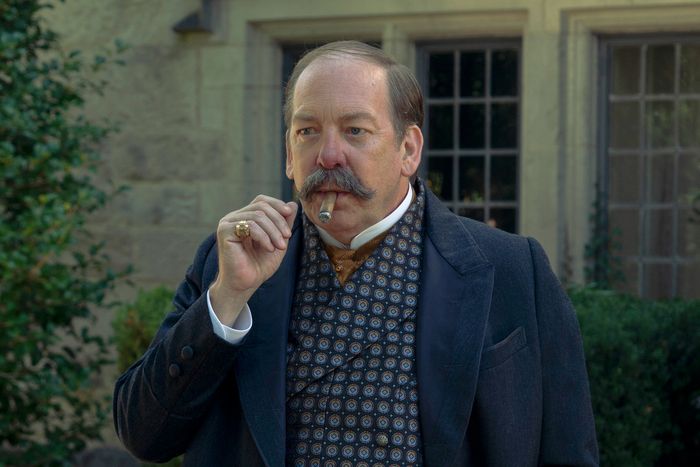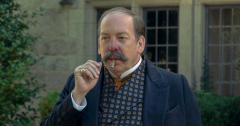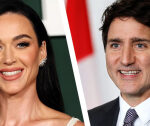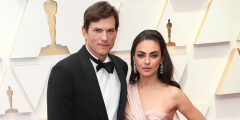
Photo: Karolina Wojtasik/HBO
So far, The Gilded Age’s third season delivered a near-royal wedding, two seances, a sudden death by carriage, and a rags-to-riches success story in the form of a young footman who invents a clock. Now, episode six finds George Russell’s once-dominant railroad empire on shaky ground. Threatened by market instability and a harsh betrayal from his disgruntled former secretary, Russell meets with Bill Camp’s J.P. Morgan, and the two join forces to steamroll the industry’s most powerful men into choosing a majority owner for the Illinois Central Railroad.
While many of the show’s characters are based on or inspired by real historical figures, J.P. Morgan is one of the few who is named directly. His return adds to the intensity of the season, anchoring the show further in its history and raising the stakes for its most invincible businessman. Camp, a Tony- and Emmy-nominated actor (most recently for his portrayal of Raymond Horgan in Apple TV+’s Presumed Innocent), was eager to play someone as towering and consequential as the legendary banker. “I wasn’t going for any sort of replica of the guy, but more the essence of him,” Camp says. “In my mind, at least, he’s always been this kind of weird, mythical monstrosity.”
I wanted to start by congratulating you on your Emmy nomination for Presumed Innocent. You also got one for The Night Of. What do you think of voters responding so warmly whenever you play a dadlike or mentor-type character?
I guess that’s great. I am a dad. I think a lot of my own father is in a lot of what I portray. Certainly not always, and definitely not exclusively. But my dad had a lot of influence on me, and I think I try to find parts of him in whomever I’m playing. Somehow I sort of cloak [myself], a little bit, in what my father had in terms of energy and tone. I take that as a compliment.
Is there anything about your father in your portrayal of J.P. Morgan?
No. [Laughs]
What was your initial reaction when you were approached for this role?
I was very excited when Bernie Telsey and the people at HBO came to me. I’m not going to venture into economics or politics, but J.P. Morgan played a fascinating part in the history and development of this country. One has to take these historical figures that are so insanely powerful and so rich with a grain of salt; the stories that get written about them, you have to wonder how embellished they are. Yet there were certain actions he took that very obviously and directly influenced the way this country became what it is.
How do you approach playing a historical figure versus a fictional character?
I’m not often asked to play people who are real. I did a little bit of research. None of us really know who the hell that guy was. Most people at that time also didn’t know who he really was, except his wife or his butler. I’m physically nothing like him. He was huge; he was tall and big. That’s not me. I just wanted to find the essence of the guy. I didn’t want to mimic him or do a sort of portrait of him, so it was more of what Julian provided in terms of the text and how he was relating with other people. I also didn’t want him to be this boorish bull in a china shop, which was how he had been described to me. I’m a scenery chewer. I wanted to have fun with him. He’s like a giant meal, and I have a big appetite.
What kind of research did you do?
I went to the Morgan Library. It fascinates me, the guy’s interest in beautiful things but also wild things. His appetite must have just been ginormous. The ownership of stuff clearly mattered to him. One has to see the many beautiful things he owned and preserved and felt the need to take care of. I think he was sort of humbled by the beauty of art and the beauty of words and great books. I have no idea where that came from, if it was the way he was raised, what he was exposed to, or if it was a certain moment in his childhood. There’s this library, and then there’s this giant money machine, and it’s an odd dichotomy, these two things that exist next to each other like that.
You described yourself similarly as having a big appetite. Did you find other similarities between yourself and J.P. Morgan?
Absolutely. I’d be lying to you if I said no. I would be lying to anybody who asked me that question about any character I played, because otherwise I feel like there’s no truth to it, and I’m just not that good of an actor. There’s always the slightest bit of me that I have to access. There’s a tiny ingredient or flavor of me, a trait, a characteristic, a memory of a thought. Now I’m getting into psychology, but I have a need to control. I have a need to manage. I have a need to be right. Mine is on a much lesser scale, but it’s still part of me. They aren’t things I’m proud of. But they’re real. They’re there. The need to be smarter than the other guy, to win — and I think J.P. Morgan wants to win.
The conversation between the men at Morgan’s house in episode six is based on history. He negotiated a lot of the loans for the Illinois Central Line. Did you discuss any of that with the rest of the actors in that scene?
I don’t remember us ever having a sit-down to talk through, you know, This character wants this and the other doesn’t want that, because the scene never gets that specific. The scene opens, I think, with Peter McRobbie talking about paying his office boy $2 instead of $3 or something like that,





